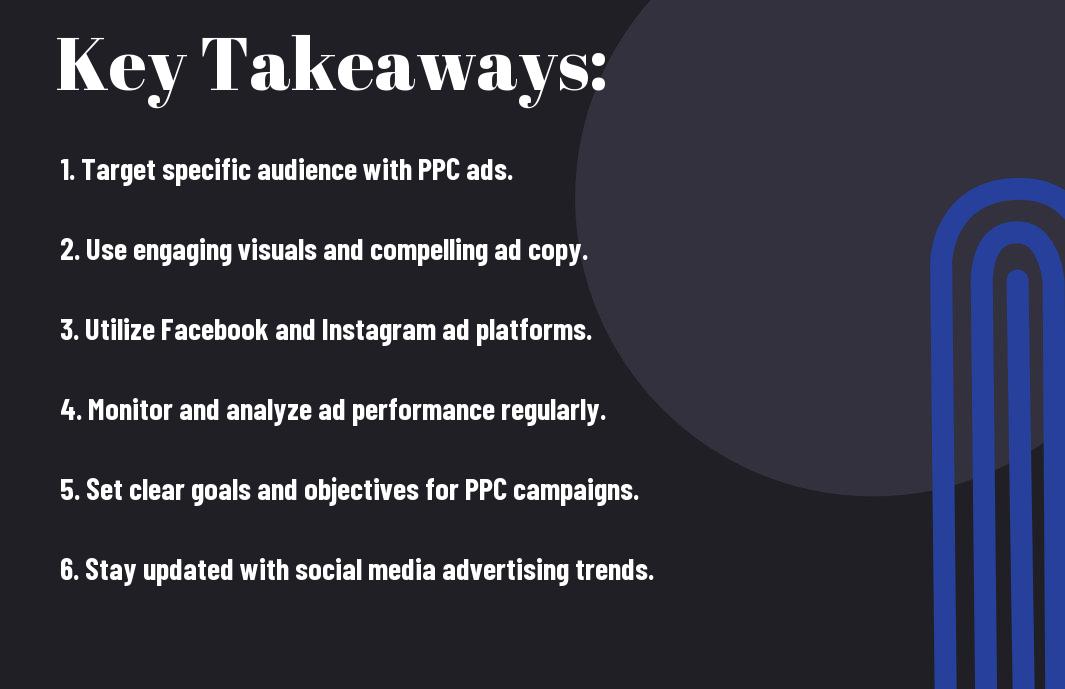Are you looking to elevate your small business and establish a strong brand presence in the digital sphere? With social media pay-per-click (PPC) advertising, you can effectively reach your target audience and drive traffic to your website while boosting your brand recognition. By leveraging the power of platforms like Facebook, Instagram, Twitter, and LinkedIn, you can create highly targeted ads that are tailored to your specific audience demographics and interests, ultimately leading to greater success for your small business.
Key Takeaways:
- Targeted Ads: Utilize social media PPC to create targeted ads to reach specific demographics and interests, increasing the likelihood of reaching potential customers.
- Brand Awareness: Use social media PPC to increase brand visibility and awareness, ensuring that your small business is seen by a wider audience.
- Engagement: Create engaging content and utilize social media PPC to drive traffic to your business, increasing customer engagement and potential sales.
- Measure ROI: Take advantage of the analytics tools offered by social media platforms to measure the return on investment of your PPC campaigns, allowing for optimization and improvement.
- Adaptability: Stay flexible and be willing to adapt your social media PPC strategies based on the changing landscape of social media and your target audience.

Establishing Your Social Media Brand
The key to leveraging social media PPC for small business success and branding is to establish a strong and recognizable brand presence across all social platforms. The building a small business internet marketing strategy is crucial for creating a cohesive and effective social media brand that resonates with your audience and drives engagement.
Defining Your Brand Identity
Before you can effectively leverage social media PPC for your small business, you need to clearly define your brand identity. This includes identifying your unique value proposition, understanding your target audience, and determining the personality and tone of your brand. Defining your brand identity will guide your messaging and content creation, ensuring that everything you share on social media aligns with your brand values and resonates with your audience.
Tailoring Your Message for Each Platform
Each social media platform has its own unique audience and features, so it’s important to tailor your message for each platform. For example, the content you share on LinkedIn, a professional networking platform, should be different from what you post on Instagram, a visual-focused platform. Tailoring your message for each platform ensures that you are effectively reaching and engaging with your audience on their preferred social channels.
By defining your brand identity and tailoring your message for each platform, you can establish a strong social media brand presence that sets you apart from your competitors and resonates with your audience. Consistency in brand messaging and tone across all platforms is key to reinforcing your brand identity and building trust with your audience.
Crafting Effective Social Media PPC Campaigns
Not leveraging social media PPC for your small business is a missed opportunity. With these platforms, you can reach a wider audience, engage directly with potential customers, and build brand awareness. To learn more about how to leverage digital marketing for small businesses, check out this blog post.
Setting Clear Objectives and Goals
When crafting your social media PPC campaigns, it’s crucial to define your objectives and goals clearly. Whether it’s to increase website traffic, generate leads, or boost sales, having a clear direction will guide your strategy and help you measure success.
Audience Targeting and Segmentation
To ensure the effectiveness of your social media PPC campaigns, you need to understand your target audience and segment them based on demographics, interests, and behaviors. This allows you to create personalized ads that resonate with different customer segments.
Creative Strategies for Engaging Ads
To capture the attention of your audience, your social media PPC ads need to be compelling and engaging. Incorporate eye-catching visuals, concise ad copy, and a strong call-to-action to encourage clicks and conversions.
Budgeting and Bidding Tactics for Small Businesses
Managing your budget effectively is essential for small businesses. With social media PPC, you can set daily or lifetime budgets, and utilize bidding tactics to get the most out of your ad spend. It’s important to monitor your campaigns closely and adjust your budget and bids as needed to optimize performance.
By focusing on these key components when crafting your social media PPC campaigns, you can maximize your small business’s reach and engagement, ultimately driving success and fostering a strong brand presence.
Measuring and Analyzing Your PPC Results
Unlike traditional advertising, the beauty of social media PPC is that you can measure and analyze the results of your campaigns in real-time. This means you can track the effectiveness of your ads and make data-driven decisions to optimize your campaigns for better results. Measuring and analyzing your PPC results is crucial for understanding your return on investment (ROI) and making informed decisions about your future advertising strategies.
Key Performance Indicators (KPIs) to Track
When it comes to measuring the success of your social media PPC campaigns, there are several key performance indicators (KPIs) that you should track. These include click-through rate (CTR), conversion rate, cost per conversion, return on ad spend (ROAS), and overall campaign performance. By monitoring these KPIs, you can gain insights into the performance of your ads and identify areas for improvement.
Tools for Tracking and Analysis
To effectively measure and analyze your PPC results, you will need to use the right tools. Platforms like Google Analytics, Facebook Ads Manager, and LinkedIn Campaign Manager offer robust analytics and reporting features that allow you to track your campaign performance. These tools provide valuable data on impressions, clicks, conversions, and other important metrics that can help you make data-driven decisions for your business.
Adjusting Your Strategies Based on Data
Once you have gathered and analyzed the data from your PPC campaigns, it’s important to adjust your strategies based on the insights you have gained. This may involve tweaking your ad copy, targeting different audience segments, or reallocating your budget based on the performance of your ads. By using the data to inform your decisions, you can maximize the effectiveness of your social media PPC campaigns and drive better results for your small business.

Advanced Techniques and Best Practices
Keep pushing the boundaries of your social media PPC campaigns by using advanced techniques and best practices to maximize your small business success and branding. Here are some strategies to help you take your social media PPC to the next level:
- Ad Optimization Techniques
| Use of Ad Extensions | Enhance your ads with additional information and links to increase engagement and drive traffic to your website. |
| Hyper-Targeted Audience Segmentation | Create highly tailored ad campaigns to target specific audiences based on demographics, interests, and behaviors, maximizing the relevance and effectiveness of your ads. |
A/B Testing for Ad Optimization
By conducting A/B testing, you can compare the performance of different ad elements such as headlines, images, and calls to action to identify which combinations yield the best results. This method allows you to continuously optimize your ads for maximum effectiveness, ultimately driving better ROI for your small business.
Integration with Other Digital Marketing Efforts
Integrating your social media PPC with other digital marketing channels such as email marketing, content marketing, and SEO can amplify your brand’s reach and impact. By aligning your messaging and coordinating your efforts across various platforms, you can achieve a more cohesive and impactful marketing strategy.
Staying Up-to-Date with Social Media Trends
Keeping up with the latest social media trends is essential for small business success in the rapidly evolving digital landscape. By staying informed about new ad formats, platform features, and industry best practices, you can ensure that your social media PPC campaigns remain relevant and competitive, helping your brand stay ahead of the curve.
Conclusion
Following this guide, you now understand the power of leveraging social media PPC for small business success and branding. By utilizing targeted advertising, engaging with your audience, and analyzing data, you can effectively reach your target market, increase brand awareness, and drive conversions. Implementing a strategic social media PPC strategy can have a significant impact on your business’s success, allowing you to stand out in a competitive market and establish a strong online presence. By continuously monitoring and optimizing your campaigns, you can maximize your return on investment and elevate your brand to new heights. With the right approach, social media PPC can be a valuable tool in your small business marketing arsenal.
FAQ
Q: What is Social Media PPC?
A: Social Media PPC, or pay-per-click advertising, is a form of online advertising in which advertisers pay a fee each time their ad is clicked on social media platforms such as Facebook, Instagram, Twitter, or LinkedIn. This form of advertising is an effective way for small businesses to reach their target audience and drive traffic to their websites.
Q: How can small businesses leverage Social Media PPC for success?
A: Small businesses can leverage Social Media PPC by identifying their target audience, creating compelling ad content, setting a budget, and utilizing targeting options provided by the social media platforms. By carefully monitoring and optimizing their campaigns, small businesses can maximize their ROI and increase brand awareness.
Q: What are the benefits of using Social Media PPC for small business branding?
A: Using Social Media PPC for small business branding can help increase brand visibility, attract new customers, and engage with the target audience. It allows small businesses to create customized ad campaigns, track performance metrics, and build brand credibility in the competitive online marketplace.
Q: Which social media platforms are best for small business PPC advertising?
A: The best social media platforms for small business PPC advertising depend on the target audience and business objectives. Facebook and Instagram are popular choices for reaching a wide audience, while LinkedIn is great for B2B advertising. Twitter and Pinterest are also effective for specific niche markets.
Q: How can small businesses measure the success of their Social Media PPC campaigns?
A: Small businesses can measure the success of their Social Media PPC campaigns by tracking key performance indicators such as click-through rates, conversion rates, cost per acquisition, and return on ad spend. Additionally, using tools such as Google Analytics or platform-specific analytics can provide valuable insights into campaign performance and help in making data-driven decisions for future campaigns.
